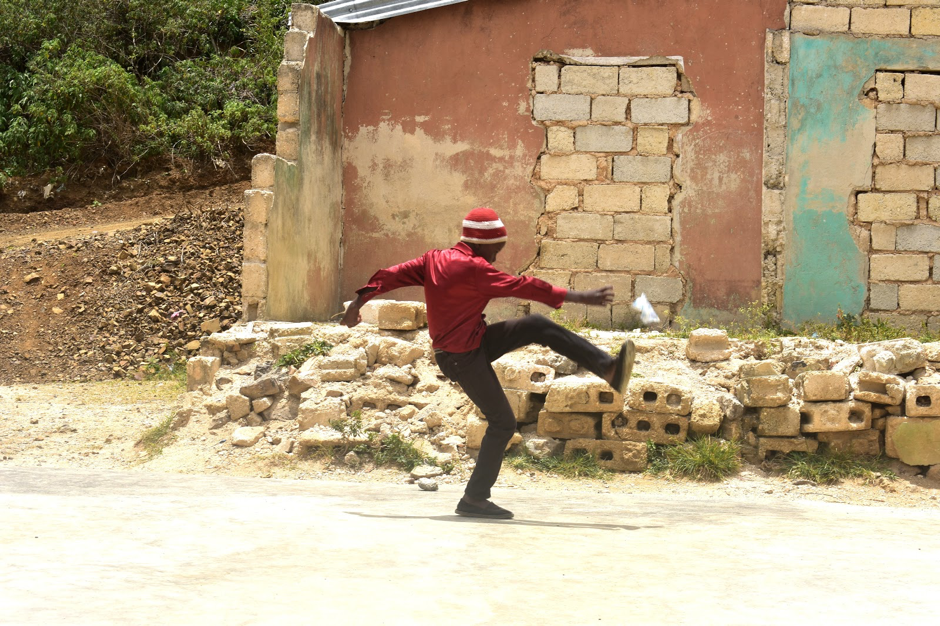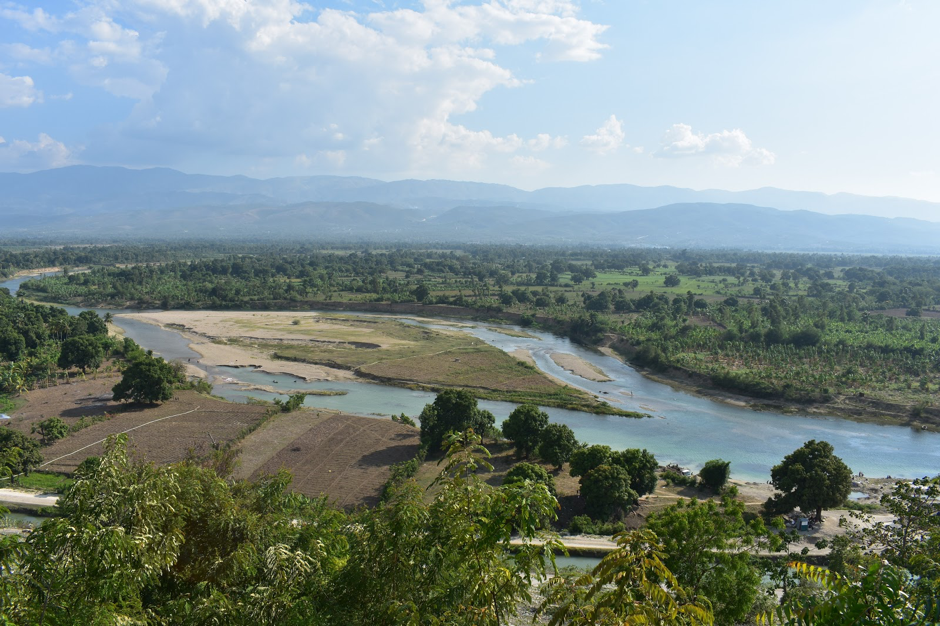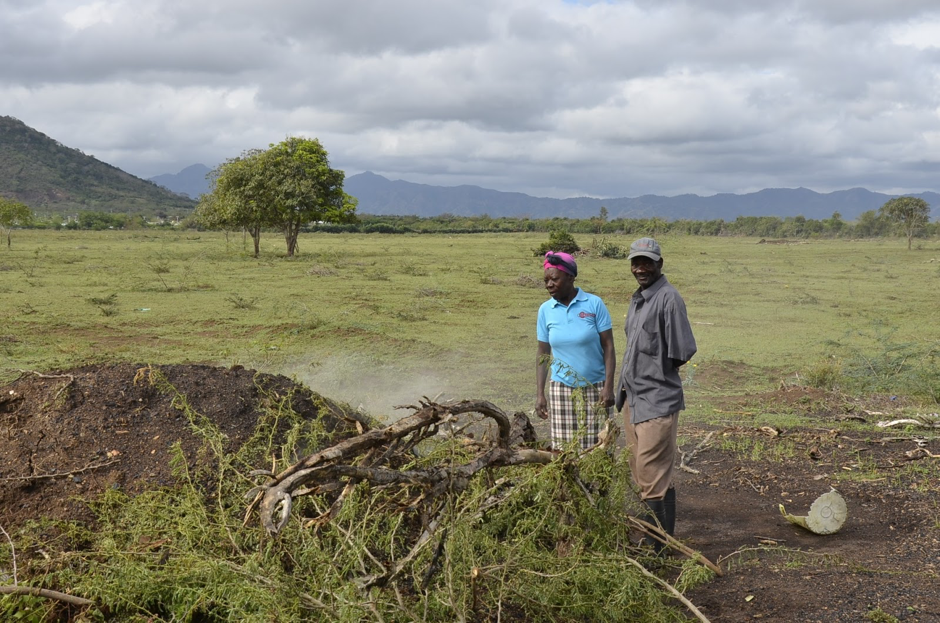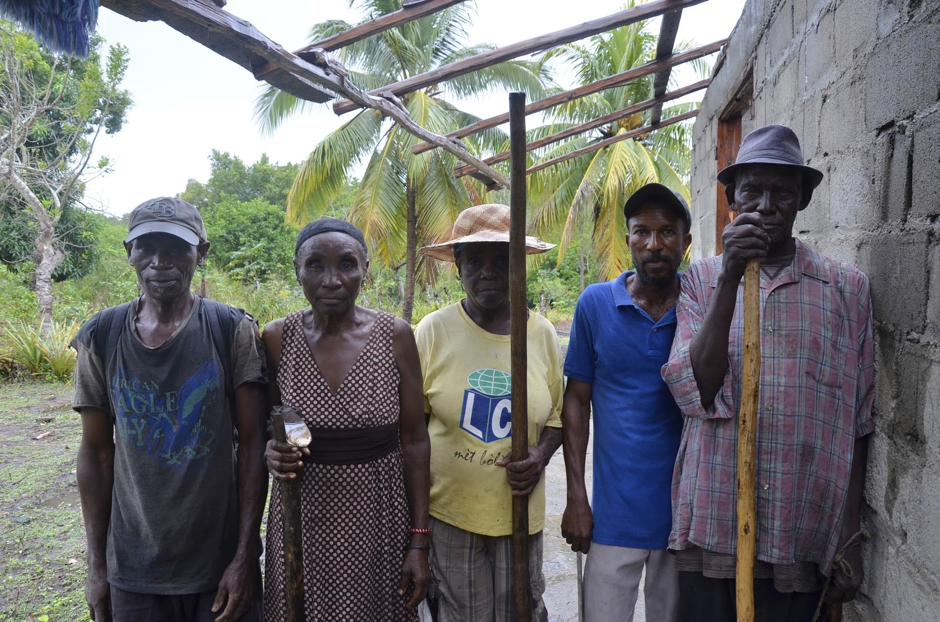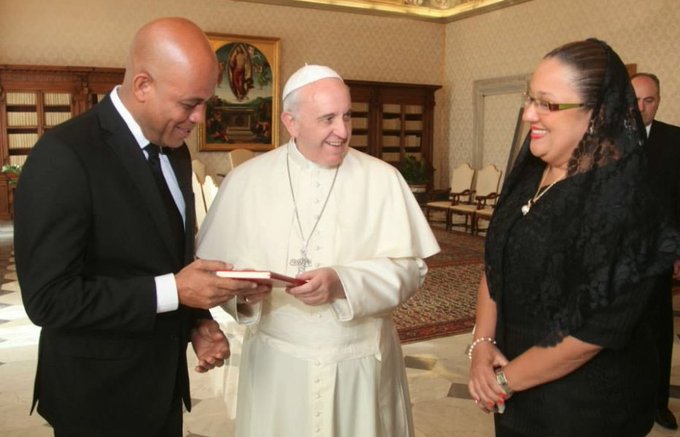However, at least the construction of Agritrans S.A. involved mechanisms that we will call quasi-legal – although not moral – through the expropriation and compensation of peasant properties, measures taken perhaps because of the international visibility of the project.
But the policy of land grabbing has deepened in recent years, according to the leaders of the main peasant organizations during a
recent colloquium on the subject held in the central region. There, for example, the national government ceded by decree no less than 8,600 hectares of fertile land to the Apaid family, one of the richest in the country. Another agricultural free trade zone is supposed to be built there, but this time for the production and export of stevia for the multinational Coca-Cola
Christiane Fonrose and her husband prepare charcoal on reclaimed land in Terrier Rouge. Photo: Lautaro Rivara
But back to the Northeast. After long walks along impassable rural roads, flooded by rain, mud and state neglect, we were able to visit several communities that have suffered and are today facing the dispossession of their lands by local landowners, foreign companies and armed gangs.
In Terrier Rouge, Irené Cinic Antoine of the “Small planters” movement told us that she has owned a large plot of 6,000 hectares of land since 1986. In 1995, under the progressive government of Jean-Bertrand Aristide, the process to legalize their tenure began. Since then, the common lands have been divided between agriculture, charcoal trees and livestock. Their ownership rights were even published in the official state newspaper, but the documents were later disappeared by anonymous hands.
We also talk to Christiane Fonrose and her husband, as they stoke the fire on the mountain of earth inside which burns the wood that will be turned into charcoal. It is one of the few remaining means of survival in the region, although its ecological costs are well known to all, particularly to the peasantry. From his unshakeable faith, Fonrose tells us: “The land is God’s thing, which God created for us. Before creating his children, God created the earth. (…) But then they took the earth out of our hands. Today we have nowhere to plant, nowhere to graze some small animals, the children cannot go to school (…) We are in a very difficult situation”.
We were also able to visit peasant organizations in Grand Basin who are currently resisting the permanent hostility of invisible actors who are trying to take over land that was ceded to them by the state, again during the Aristide era. After another long trek along the difficult rural roads, our interview had to be conducted in the pouring rain, as even the roofs and doors of the small house on the plot were stolen. Here, on the edge of mineral-rich mountains, 1,500 organized peasants have been able to work 148 kawo of land (about 200 hectares) to produce sugar cane, maize, manioc and even honey and kleren – a peasant sugar cane brandy – in a sovereign and agro-ecological way.
The farmers of MOPAG have been resisting eviction attempts in Grand Bassin for years. Photo: Lautaro Rivara
A little over a year ago, a heavily armed group broke in, disrupting their crops, stealing or killing their animals, destroying fences, buildings and their meager agricultural implements. Evidently these were neither neighbors nor amateurs, as the operation involved the deployment of expensive bulldozers. Even today, the land that was taken remains unproductive, and the peasants are constantly threatened not to try to recover it. So far, no state body has given them any response. “Without the land, outside the land, we peasants are worthless. We voted for them ourselves, but it seems that they don’t need us anymore,” concludes Antoine.
Today there are barely 350 people left, including only a handful of young people: most of them have been forced to migrate to the capital Port-au-Prince or even abroad. In the long siege they have been suffering since then. The National Institute of Agrarian Reform (INARA) has hardly dared to take sides with them. Coincidentally, according to recent reports, the Moïse government is seeking to eliminate this body in the new constitution it is now preparing. According to Wilson Messidor, leader of MOPAG, the project to dispossess them of their land would be closely linked to the mining resources in the area, and to the construction of the so-called villages, semi-closed residential neighborhoods that USAID is building for the workers in the free trade zones.
USAID appears, in fact, as the de facto civil authority in these territories, and its projects are constantly growing and multiplying, as indicated by the numerous signs on the roadsides. According to an anonymous Cuban engineer, the US mega-cooperation organization operates through loans and projects, indebting the state and the communities, in order to guarantee control of strategic areas for their water and mineral resources.
It matters little, following Eduardo Galeano’s metaphor, whether the monarch is King Banana, Queen Stevia or King Manufacture. Haiti continues to be determined by the blessings of nature and the curses of those who dominate history. We will continue, in the next note, to unravel the mysteries of this “poor rich country” which, in the international division of labor, has been subjected to the task of exporting poverty and importing humanitarian aid. We will talk about the export processing zones and the bizarre project to turn Haiti into the “Taiwan of America”.




